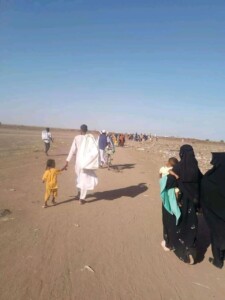16 Days of Activism against Gender-Based Violence in Sudan
Activities have been taking place in Sudan as part of the annual international 16 Days of Activism against Gender-Based Violence (GBV) since November 25, with extra attention on the position of displaced women. The No to Women’s Oppression Initiative commenced its part of the international campaign with various activities today.
 The Launching of the 16 Days of Activism against GBV in Beleil, South Darfur (Mariama Barry)
The Launching of the 16 Days of Activism against GBV in Beleil, South Darfur (Mariama Barry)
Activities have been taking place in Sudan as part of the annual international 16 Days of Activism against Gender-Based Violence (GBV) since November 25, with calls for extra focus on the position of displaced women. The No to Women's Oppression Initiative commenced its part of the international campaign with various activities today.
The No to Women's Oppression Initiative announced the launch of its campaign on Wednesday.
Rabha Ismail, a member of the Initiative, told Radio Dabanga on Wednesday that the campaign will begin with a forum to discuss women’s issues and the violence they face, including the experiences of women during the 2018 December revolution as they faced violence, murder, rape, and detentions.
The 16 Days of Activism Against GBV is an annual international campaign that takes place between November 25 and December 10 and the No to Women’s Oppression Initiative has been taking part and played an important role in organising activities in Sudan in the past years.

Inclusivity
Ismail denied common criticism that the organisation focusses on women in Khartoum only and said that members of the Initiative visited Darfur, Blue Nile region, and eastern Sudan in the past three months to stand with women there, defending their rights and promoting women’s participation in political and public life.
She added that the 16-day campaign includes women in all states of Sudan.
Zahra Abdelnaeem, representative of civil society organisations in North Darfur, called for the need to unify the feminist agenda in order to establish a strong base to combat all forms of violence against women.
She said it is necessary to reach areas in the countryside and displacement camps, where women face different challenges, and pay special attention to those who were subjected to violence because of wars.
Displaced women are especially vulnerable. They often face assaults from militant herders, and in the past especially from the Janjaweed militias during the war in Darfur.
The Darfur Women Action Group posted an overview of recent GBV cases on its social media, outlining plenty of events in which girls and women were raped or assaulted, often by gunmen.

Other initiatives already took on and since November 25 in Sudan. EU staff in Sudan wore orange to call for “a future free from violence against women and girls”.
In South Darfur women police officers received extra training on investigations and managing GBV cases on November 27. The UNITAMS Police Liaison Officer Mariama Barry, who was involved in the training, also spoke at a launch event in the Beleil refugee settlement in South Darfur.
Special unit to combat violence
North Darfur announced its intention to establish a unit to combat violence against women in the state.
Addressing the audience at the celebratory inauguration of the campaign on Wednesday morning in El Fasher, North Darfur, Director of the Ministry of Welfare Ibrahim Mousa said that the Ministry will conduct awareness lectures for young women and girls in all the schools and camps in the city.
He added that the ministry will also maintain the Urinary Fistula* Centre in the Obstetrics and Gynaecology Hospital in El Fasher.

Dire situation in Northern state
Ebaa Murtada, an activist for women's issues in Northern State, reported a serious lack of doctors and obstetrics and gynaecology departments, especially in the far peripheral areas of the state.
“In some areas there are not even midwives,” she told Radio Dabanga. “We don’t even have measurement mechanisms to determine mortality rates among women.”
Many women are also exposed to domestic violence. “The economic situation is dire, and there is a lot of hidden poverty,” she explained. This makes women more vulnerable as it becomes financially impossible for them to leave their partners.
The culture of the local communities prevents women from going out to work or take up education for future work. “Going out to education and work is unacceptable for girls in many communities in the north,” Murtada explained.
She said that her activist group is trying to help women get out of the circle of poverty by working in trade and selling tea or food “in the informal sector”.
* A fistula is an abnormal connection or passageway between two organs or body cavities that do not usually connect. A urinary fistula is an abnormal passage between the bladder and the vagina and between the rectum and the vagina. In most countries in Africa, the most common cause of fistulas is childbirth or sexual violence, most conspicuously in the form of rape, gang rape, and the insertion of sharp objects into the vagina or rectum.











 and then
and then